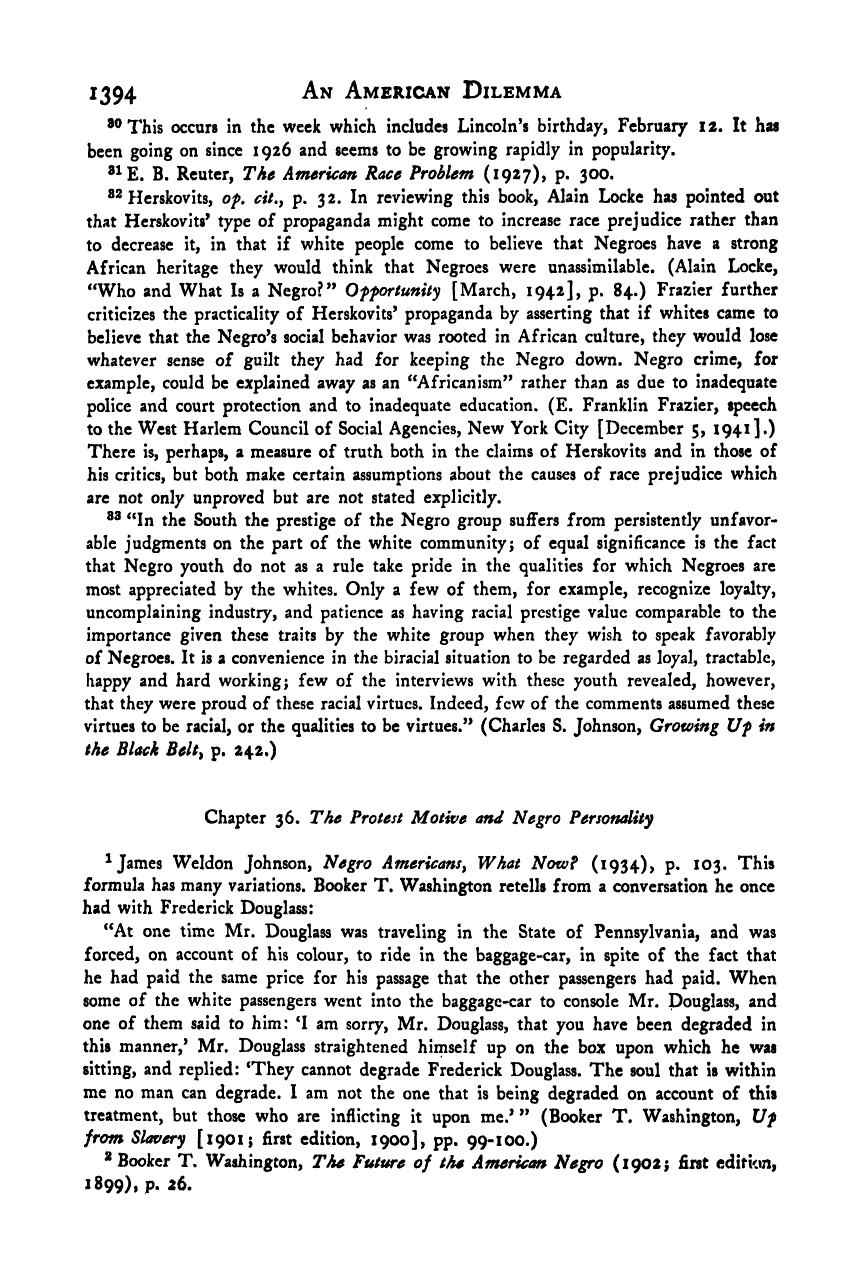Note: Gunnar Myrdal died in 1987, less than 70 years ago. Therefore, this work is protected by copyright, restricting your legal rights to reproduce it. However, you are welcome to view it on screen, as you do now. Read more about copyright.
Full resolution (TIFF) - On this page / på denna sida - Footnotes - Chapter 35 - Chapter 36

<< prev. page << föreg. sida << >> nästa sida >> next page >>
Below is the raw OCR text
from the above scanned image.
Do you see an error? Proofread the page now!
Här nedan syns maskintolkade texten från faksimilbilden ovan.
Ser du något fel? Korrekturläs sidan nu!
This page has never been proofread. / Denna sida har aldrig korrekturlästs.
1394 An American Dilemma
®®This occurs in the week which includes Lincoln’s birthday, February I2. It has
been going on since 1926 and seems to be growing rapidly in popularity.
B. Reuter, The American Race Problem (1927), p. 300.
Herskovits, of, W/., p. 32. In reviewing this book, Alain Locke has pointed out
that Herskovits’ type of propaganda might come to increase race prejudice rather than
to decrease it, in that if white people come to believe that Negroes have a strong
African heritage they would think that Negroes were unassimilable. (Alain Locke,
“Who and What Is a Negro?” Offortunity [March, 1942], p. 84.) Frazier further
criticizes the practicality of Herskovits’ propaganda by asserting that if whites came to
believe that the Negro’s social behavior was rooted in African culture, they would lose
whatever sense of guilt they had for keeping the Negro down. Negro crime, for
example, could be explained away as an “Africanism” rather than as due to inadequate
police and court protection and to inadequate education. (E. Franklin Frazier, speech
to the West Harlem Council of Social Agencies, New York City [December 5, 1941].)
There is, perhaps, a measure of truth both in the claims of Herskovits and in those of
his critics, but both make certain assumptions about the causes of race prejudice which
are not only unproved but are not stated explicitly.
“In the South the prestige of the Negro group suffers from persistently unfavor-
able judgments on the part of the white community; of equal significance is the fact
that Negro youth do not as a rule take pride in the qualities for which Negroes are
most appreciated by the whites. Only a few of them, for example, recognize loyalty,
uncomplaining industry, and patience as having racial prestige value comparable to the
importance given these traits by the white group when they wish to speak favorably
of Negroes. It is a convenience in the biracial situation to be regarded as loyal, tractable,
happy and hard working; few of the interviews with these youth revealed, however,
that they were proud of these racial virtues. Indeed, few of the comments assumed these
virtues to be racial, or the qualities to be virtues.” (Charles S. Johnson, Growing Uf in
the Black Belt^ p. 242.)
Chapter 36. The Protest Motive and Negro Personality
^ James Weldon Johnson, Negro Americans^ What Now? (1934), p. 103. This
formula has many variations. Booker T. Washington retells from a conversation he once
had with Frederick Douglass:
“At one time Mr. Douglass was traveling in the State of Pennsylvania, and was
forced, on account of his colour, to ride in the baggage-car, in spite of the fact that
he had paid the same price for his passage that the other passengers had paid. When
some of the white passengers went into the baggage-car to console Mr. Douglass, and
one of them said to him: ‘I am sorry, Mr. Douglass, that you have been degraded in
this manner,* Mr. Douglass straightened himself up on the box upon which he was
sitting, and replied: ‘They cannot degrade Frederick Douglass. The soul that is within
me no man can degrade. I am not the one that is being degraded on account of this
treatment, but those who are inflicting it upon me.’ ” (Booker T. Washington, Uf
from Slavery [1901; first edition, 1900], pp. 99-100.)
* Booker T. Washington, The Future of the American Negro (1902; first edition,
1899), P- ^6.
<< prev. page << föreg. sida << >> nästa sida >> next page >>